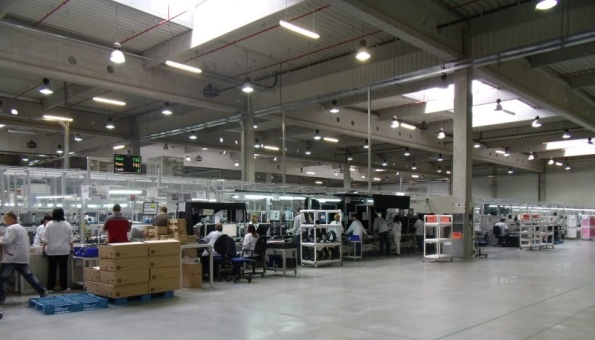Dell and HP Struggle to Reinvent As PC Industry Migrates To Asia
If you've paid any attention to the PC industry in the past few years, you're aware that things aren't as rosy as they used to be. After decades of annual growth, major manufacturers like HP and Dell have both either floated the idea of exiting the consumer space (HP) or gone private (Dell).
Contrast that with steady growth at companies like Asus and Lenovo, and some analysts think the entire PC industry could move to Asia in the next few years. The ironic part of the observation is that in many ways, this has already happened.
Intel still has major manufacturing resources in the United States and across the world in Israel, Ireland, Malaysia, and China. GlobalFoundries has facilities in upper New York State and Dresden, as well as the Singapore-based fabs it acquired when it bought Chartered Semiconductor. Samsung has some manufacturing in the US as well.
But these companies aren't the rule -- they're the exception to it. Companies like Compal, Wistron, and Pegatron handle the majority of PC manufacturing. Motherboards, RAM, and NAND flash are often built in China; Samsung announced a $7B NAND flash plant in April of last year. The Asia-Pacific manufacturers are more focused on the consumer electronics market and better able to cope with low margins thanks to rapid adoption and huge potential customer bases.

Wistron -- Where your PC sausage gets made...
Apple has proven that high margin hardware can be extremely profitable, but none of the PC OEMs have been willing to risk the R&D costs or carry new products for a significant period of time while they adapt designs and improve market share. The problem with the "cut costs, period" approach is that in the long run, the major US PC manufacturers will be forced out of the business altogether.
Would this be bad for consumers? Arguably not. If you buy a Lenovo or Asus system, you're buying a computer from an Asian manufacturer that uses Asian manufacturing, as opposed to a US manufacturer using Asian manufacturing. "Made in the USA" is effectively meaningless in this context; a computer may be sold by BestBuy or online at a US-based manufacturing, but all of the assembly and integration is already handled overseas.
It's unfortunate all the same. If Dell and HP are forced out of the business they helped to pioneer, it'll be as much a failure of their own vision as competitive pressure from other companies. It's not just that Dell and HP missed the tablet boat -- that failure can be laid at Microsoft's feet as much as their own -- it's that neither company has articulated a strategy for creating brand value as opposed to iterating on "better, faster, cheaper."
"Cheaper" has already undermined "better" to such a degree that simply driving prices lower won't fix anything. "Faster" has been supplanted by "fast enough." If the US OEMs can't find ways to build products consumers want to buy, they don't deserve the positions they currently occupy.
Contrast that with steady growth at companies like Asus and Lenovo, and some analysts think the entire PC industry could move to Asia in the next few years. The ironic part of the observation is that in many ways, this has already happened.
Intel still has major manufacturing resources in the United States and across the world in Israel, Ireland, Malaysia, and China. GlobalFoundries has facilities in upper New York State and Dresden, as well as the Singapore-based fabs it acquired when it bought Chartered Semiconductor. Samsung has some manufacturing in the US as well.
But these companies aren't the rule -- they're the exception to it. Companies like Compal, Wistron, and Pegatron handle the majority of PC manufacturing. Motherboards, RAM, and NAND flash are often built in China; Samsung announced a $7B NAND flash plant in April of last year. The Asia-Pacific manufacturers are more focused on the consumer electronics market and better able to cope with low margins thanks to rapid adoption and huge potential customer bases.

Wistron -- Where your PC sausage gets made...
Apple has proven that high margin hardware can be extremely profitable, but none of the PC OEMs have been willing to risk the R&D costs or carry new products for a significant period of time while they adapt designs and improve market share. The problem with the "cut costs, period" approach is that in the long run, the major US PC manufacturers will be forced out of the business altogether.
Would this be bad for consumers? Arguably not. If you buy a Lenovo or Asus system, you're buying a computer from an Asian manufacturer that uses Asian manufacturing, as opposed to a US manufacturer using Asian manufacturing. "Made in the USA" is effectively meaningless in this context; a computer may be sold by BestBuy or online at a US-based manufacturing, but all of the assembly and integration is already handled overseas.
It's unfortunate all the same. If Dell and HP are forced out of the business they helped to pioneer, it'll be as much a failure of their own vision as competitive pressure from other companies. It's not just that Dell and HP missed the tablet boat -- that failure can be laid at Microsoft's feet as much as their own -- it's that neither company has articulated a strategy for creating brand value as opposed to iterating on "better, faster, cheaper."
"Cheaper" has already undermined "better" to such a degree that simply driving prices lower won't fix anything. "Faster" has been supplanted by "fast enough." If the US OEMs can't find ways to build products consumers want to buy, they don't deserve the positions they currently occupy.

